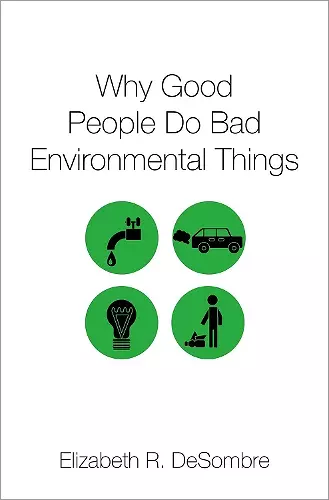Why Good People Do Bad Environmental Things
Format:Hardback
Publisher:Oxford University Press Inc
Published:28th Jun '18
Currently unavailable, and unfortunately no date known when it will be back
This hardback is available in another edition too:
- Paperback£25.99(9780197523803)

No one sets out to intentionally cause environmental problems. All things being equal, we are happy to protect environmental resources; in fact, we tend to prefer our air cleaner and our species protected. But despite not wanting to create environmental problems, we all do so regularly in the course of living our everyday lives. Why do we behave in ways that cause environmental harm? It is often easy and inexpensive to behave in ways with bad environmental consequences, but more difficult and costly to take environmentally friendly actions. The incentives we face, some created by the nature of environmental resources, some by social and political structures, often do not make environmentally beneficial behavior the most likely choice. Furthermore, our behavior is conditioned by habits and social norms that fail to take environmental protection into consideration. In this book, Elizabeth R. DeSombre integrates research from political science, sociology, psychology, and economics to understand why bad environmental behavior makes perfect sense. As she notes, there is little evidence that having more information about environmental problems or the way an individual's actions contribute to them changes behavior in meaningful ways, and lack of information is rarely the underlying cause that connects behavior to harm. In some cases such knowledge may even backfire, as people come to see themselves as powerless to address huge global problems and respond by pushing these issues out of their minds. The fact that causing environmental problems is never anyone's primary goal means that people are happy to stop causing them if the alternative behavior still accomplishes their underlying goals. If we can figure out why those problems are caused, when no one intends to cause them, we can develop strategies that work to shift behavior in a positive direction. Over the course of this book, DeSombre considers the role of structure, incentives, information, habit, and norms on behavior in order to formulate lessons about how these factors lead to environmentally problematic behavior, and what understanding their effects can tell us about ways to change behavior. To prevent or address environmental problems, we have to understand why even good people do bad environmental things.
This volume combines psychological, economic, and environmental approaches to offer a unique perspective on environmental policy. Addressing the widespread polarization over global climate change, DeSombre (Wellesley College) argues that nobody intends bad environmental effects...these and other themes are explored in a tightly organized book featuring factors such as social structures, extrinsic versus intrinsic factors, positive incentivization (e.g., subsidy), negative incentivization (e.g., regulation), attitudes, and scientific knowledge. Documented with 30 pages of notes and 26 pages of references, the book is an excellent resource for readers concerned about environmental policy. * F. T. Manheim, George Mason University, CHOICE *
ISBN: 9780190636272
Dimensions: 157mm x 236mm x 28mm
Weight: 499g
264 pages